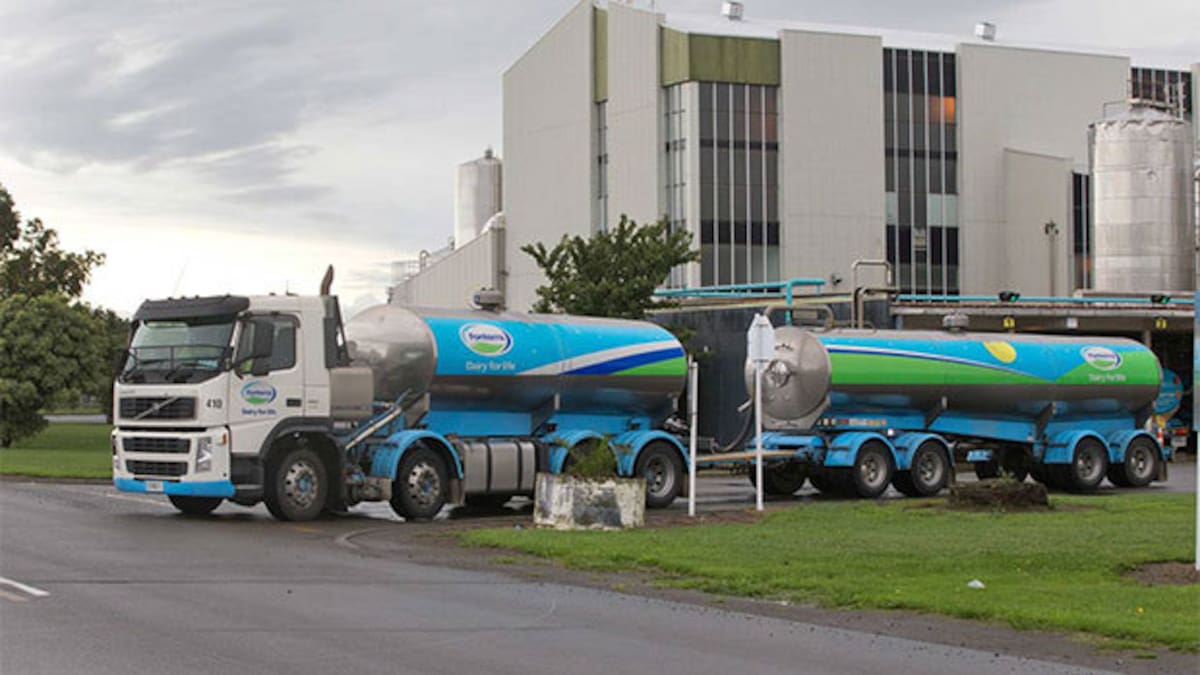Chisholm, who owns and lives on a 72ha farm at Chatto Creek in Central Otago with his wife Ellen and three children, says he is transitioning from the speaking circuit and other related activities so that he can spend more time anchored in a region he loves.
He recently obtained his real estate ticket and starts with a local firm in a fulltime role in two weeks – we can’t reveal the company yet, because his soon-to-be colleagues need to hear first.
Will his high profile give him a headstart?
“I don’t know whether people will view me as shiny ass TV wanker or what they’ll think. It’s up for them to decide, but someone once told me it’s not what you know, it’s who knows you.
“I guess if the journalism and reality TV have given me anything, it’s given me a little profile that might help me in the industry, but I don’t want to be a millionaire. I just want to stay living where I live with my family and survive in this community.
“Hopefully, this will allow me to do that.”
Chisholm says he’s always been fascinated by real estate and hopes to focus on rural lifestyle property.

“I’ve always been a massive fan of farm tours and so I’m quite excited about carrying that on.
“If it means I can keep the family on a 72-acre block at Chatto Creek, I’ll sell anything to survive, but my hope is that I can focus on the rural lifestyle space because that’s where my passion is and where I really connect with people.”
It’s clear he’s ready to keep his previous career in the rear-vision mirror.
“Someone from a production company rang me the other day and said ‘How about doing some work?’, and I said, ‘No, I don’t want to’.
“They couldn’t believe it but it’s just not the direction I’m going in. I don’t want to work for people that don’t treat people well. I’m running out of heartbeats, so I want to do what I want to do and spend more time with people I want to spend it with.”

He said he had been on the road for about 20 years with his journalism and MC work. “I’m looking forward to spending more time at home with my kids, coaching rugby and soccer and cricket and whatever they’re doing and more nights on the couch watching rugby league and more time in their local community here.”
Twelve months ago, when he first kicked around the idea of a real estate role, the market wasn’t looking too hot.
“It’s amazing how much of a difference 12 months can make. Things are on the improve, things are on the up, and it’s probably a really good time to think about working in real estate.
“I haven’t really had a proper job for about five and a half years, so I’m really ready to get my teeth into something and see how good I’m going to be at this next game.”
He takes his work on the farm seriously, with a small sheep stud.
Real estate would be a fulltime role. “I do a lot of farming now in the dark anyway… so that will probably just continue.
“For me, it’s a passion and it’s my medicine. I’ve got a couple of kids who are very excited about it now and they’ve got their own Southdown sheep stud starting up with six ewes arriving from Canterbury to go with their other four.
“It’s part of who I am, and I feel very privileged to be able to farm a little piece of land. It’s not an economic unit, but that doesn’t bother me.”
Stuff closing newspapers
Publisher Stuff is closing around 15 community newspapers – including its stable of long-running Auckland free titles – with the loss of up to 15 jobs.
The media company dropped the news on its own website yesterday, with the headline that “several” newspapers were closing – on closer inspection, the list of casualties extends beyond a dozen.
The titles are Cambridge Edition, Feilding Rangitīkei Herald, Franklin County News, Hutt News, Kapi Mana News, Nelson Tasman Leader, Northern Outlook, South Taranaki Star, Southern Outlook and Auckland Community Newspapers.
The three-times-a-week Marlborough Express newspaper – which had been a daily newspaper up until 2017 – would move to digital only, the company said.

Stuff did not specifically name the Auckland titles but under the Auckland Community Newspapers umbrella sit at least half a dozen mastheads: Rodney Times, Central Leader, Eastern Bays Courier, Manukau/Papakura Courier, North Shore Times and the Western Leader.
These titles, in one form or another, have been around for many decades; theRodney Times’ history stretches back to 1901, while theNorth Shore Timeswas first published in 1949.
READ THE FULL STORY, COMMENTS AND ANALYSIS HERE
Battle royale at Stuff
A battle royale is emerging within Stuff, with the company proposing to scrap and replace journalists’ health insurance entitlements – a move that staff say would be “hugely unpopular” – and an early stand-off over pay negotiations.
The media company has employed no-nonsense consultant Adrian Tocker to lead its collective contract negotiations with the E tū union, representing journalists.
Tocker won’t come cheap – and he won’t come with any intention other than getting the very best for the company.
On the other hand, the E tū union, with the likes of former MP Michael Wood waiting in the wings, is likely to see this as another high-profile opportunity to reinforce its principles in an industry that has been beset by cost-cutting and job losses over the past two years.
Emails obtained by Media Insider reveal Stuff’s union-represented journalists are perturbed by the company’s early position on several fronts.
They describe “highlights and lowlights” following a bargaining meeting with the company last week, saying the company “is holding a pay offer hostage” and “Stuff wants to axe our health insurance”.
“As you know, we’ve asked for an overall pay increase of 6.5%, including a reform of the pay scale to be more aligned with how RNZ calculates things,” says an email sent by a Stuff journalist delegate, and co-signed alongside 10 others, to union members.
“It aims the largest % increases at our intermediate journalists. We want them to see journalism and Stuff as a viable career path.”
The email states, however, that an expected counter-offer from Stuff did not eventuate at the meeting.
“Our E tū advocate Michael Gilchrist explained how this system works and provided them with market data, but by the end of the day, the consultant threatened that if we did not withdraw our claim to reunite the collective agreement then we wouldn’t see a pay offer.
“But it’s not up to him/Stuff to dictate this and we will not roll over to their divide-and-conquer strategy.
“Keeping the pay offer hostage also appears to go against the Employment Relations Act, which says even if we come to a deadlock on one particular claim, other claims should still be responded to.”
One of the issues is that the previously single collective contract at Stuff has now been divided into two – one for Stuff Digital, the company that operates stuff.co.nz, and one for Stuff Masthead Publishing, the company that looks after the company’s digital subscription websites and newspapers.

Journalists were earlier this week preparing to send a petition to Stuff owner and chief executive Sinead Boucher, “calling on our shared boss to see sense and let us reunite the collective”.
It is understood E tū represents more than 140 journalists at Stuff.
The journalist delegates pointed out in their email that Boucher “in comms to us talks about Stuff Group and our collective power as NZ’s number one media company. She has the power to stop the nonsense”.
It is understood Stuff staff have access to health insurance as part of their current entitlements. The company has used this at times as a drawcard to try to poach journalists from other organisations.
However, the delegates’ email to union journalists reveals: “They have also sought to scrap our health insurance, in exchange for an annual health and wellbeing allowance.
“We told them this would be hugely unpopular (we all know how hard it is to keep allowances up with inflation – case and point [sic] being the existing negotiations), but they stand by it.”
What do the parties say?
So far, it appears negotiations have only started for the Stuff Masthead Publishing collective.
“As of sending this, Stuff Digital negotiations are yet to begin,” says the email sent to union members last week.
“Michael Gilchrist is chasing this up, but we are unwavering in our desire to reunite the collective and negotiations.”
Stuff Masthead Publishing managing director Joanna Norris sent a statement to Media Insider this week, in response to a range of specific questions: “There are a range of claims on the table in our preliminary negotiations with E tū. In keeping with our good faith and confidentiality commitments, we will not be commenting further.”
Tocker also declined to comment yesterday. “As you know, I can’t make any comment on that. You’ll have to go back through Stuff and talk to them.”
Neither a Stuff journalist delegate nor Gilchrist would comment.
The negotiations are already getting tense and messy, with union delegates claiming Stuff won’t negotiate the Masthead Publishing collective contract if Stuff Digital staff members/delegates are in the room.
It’s an untimely issue for Stuff, following the launch of its new Stuff Digital-Trade Me partnership this week.
Trade Me content and branding have started appearing on the Stuff homepage, part of new arrangements following Trade Me’s acquisition of 50% of Stuff Digital.
That acquisition is believed to have led to a hefty payday for Boucher, although the commercial arrangements have so far been kept a closely guarded secret.

Boucher bought Stuff from Australia’s Nine Entertainment for a nominal $1 five years ago and spoke at the time of her intention to establish a staff share scheme.
That evolved, in 2021, to the establishment of a staff trust, controlled by employee representatives. The trust would own a 10% stake in the company and the trust representatives would be selected by workers.
According to a news report in Stuff quoting Boucher at the time, the arrangement meant staff would receive through the trust a share of any dividends Stuff paid out, and 10% of the sale proceeds if Stuff was later sold or listed.
Last month, Media Insider quizzed Boucher about the staff trust in light of the Trade Me acquisition – and whether workers would benefit.
“The idea behind that is that I’ve gifted 10% of the value of the company to staff that will be handled through the staff trust,” she said at the time.
“So if and when we make any distributions out of things like this deal … the staff will definitely benefit from that.
“We’ve still got a couple of months at least to go before the deal is completed and a few other things to do like that, but it will definitely be a watch this space and we will keep them informed.”
Well-known Kiwi injuncts media organisation
A well-known New Zealander has been successful in securing a court injunction to ensure their name is in no way published or identified in a recently released piece of journalism.
The High Court has issued an injunction, suppressing the names of not just the prominent New Zealander, but the media organisation and reporter as well.
The media organisation told Media Insider that in the course of preparing the investigation, it was “served with an application for an injunction that sought to prevent naming a public figure”.
“The injunction was made permanent when … management subsequently decided not to challenge the interim injunction.”
They did not wish to use funds “in a potentially lengthy legal battle to name a person of peripheral interest to the story”.
“Court orders prevent [us] from disclosing any further information in respect of the injunction.”
Lawyers representing the well-known New Zealander either did not return messages or would not comment.
Two Good Polls
and..
Hipkins and NZME’s ‘Tory owners’
Whether it was a throwaway line, or something he genuinely thinks is true, Chris Hipkins certainly raised eyebrows in some media and social media circles with his comments this week about NZME, publisher of the NZ Herald and Newstalk ZB.
He appeared on NZME’s Wellington Mornings show on ZB with host Nick Mills and stated, in response to Mills’ question about why ram raids were no longer prominent in the media, “it’s cause your Tory owners at NZME have just decided not to put it on the front page any more”.
“It’s still happening, it’s just NZME have decided that it’s not in the Government’s best interests and they do the National Party’s singing for them … so they’re not covering it as much anymore.”
On the one hand, the right-wing Kiwiblog website described Hipkins as “hysterical”, while Hipkins did have support from fellow Labour MPs, such as Willie Jackson, and other left-wing supporters.
It certainly appears that politicians are increasingly targeting media that they believe are treating them unfairly – witness the actions in recent times of the likes of Act leader David Seymour with John Campbell; Winston Peters with RNZ’s Corin Dann; and Hipkins now with NZME.
Hipkins did not respond to a Media Insider request for comment yesterday.
NZME editor in chief Murray Kirkness said: “NZME has thousands of shareholders. All editorial decisions are made independently by our editors and newsrooms.”
I enjoyed NZ Herald political editor Thomas Coughlan’s analogy on Heather du Plessis-Allan’s drive show on ZB later on Wednesday, in which he likened the media to a rugby referee.
Everyone liked to blame the ref from time to time, he said. While referees did not always get it right, they usually did not dictate the outcome of a match.
“A good team will prevail, in more games than not, because of their performance rather than the ref… and I think it’s the same in politics.”
There were issues from time to time that Hipkins and politicians could certainly tackle the media on, Coughlan said.
Media had a powerful role and politicians had the right to call them out if something hadn’t been handled appropriately. But he suggested Hipkins had selected the wrong topic.
“I would imagine the reason why there aren’t so many ram raids on the front page is [that] there are just far fewer ram raids,” Coughlan said.
He then did what any good journo would do and produced some stats: ram raids have fallen from a recent annual high of 714 in 2022 to 209 in 2024 and just 45 halfway through 2025.
NZME is publicly listed, with thousands of shareholders.
Its biggest owner right now is an Australian fund, Spheria Asset Management, with holdings of just under 20%, while Auckland businessman Jim Grenon – now a board director after a much-publicised push for a board overhaul and an improvement in the company’s performance – owns 13%.
AT contracts
Outdoor advertising firms are expecting to hear a progress update today on Auckland Transport’s lucrative outdoor tenders.
The tender process – for contracts valued at $350 million over the next 10 years – started all over again this year, after what one industry source described earlier as a “clusterf***”.
Before the tender process started all over again, MediaWorks, which currently looks after advertising on the Auckland Transport (AT) buses and some billboards, MediaWorks had been rumoured to be the frontrunner to win the lion’s share of new contracts.
But there are a number of other industry players, such as OohMedia – which currently looks after advertising at bus shelters – JCDecaux and Go Media, which are all in the mix.
In an update to Media Insider last week, AT chief financial officer Mark Laing said: “The Auckland Transport Board was updated on our out-of-home media services procurement process at its regular meeting on Tuesday.
“Our team is progressing well with this process and we expect to provide an update to participants shortly.”
Editor-at-Large Shayne Currie is one of New Zealand’s most experienced senior journalists and media leaders. He has held executive and senior editorial roles at NZME including Managing Editor, NZ Herald Editor and Herald on Sunday Editor and has a small shareholding in NZME.
Watch Media Insider – The Podcast on YouTube or listen to it on iHeartRadio, Spotify, Apple Podcasts or wherever you get your podcasts.





